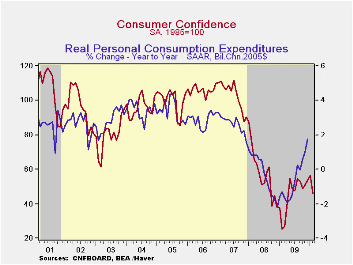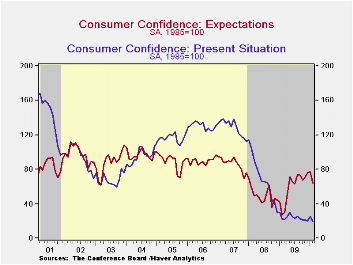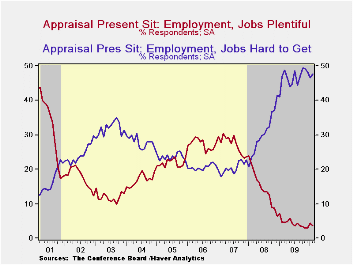 Global| Feb 23 2010
Global| Feb 23 2010U.S. Consumer Confidence Falls Sharply
by:Tom Moeller
|in:Economy in Brief
Summary
There was a slowing of retail sales during December and January. More weakness may be in the offing given the latest souring of consumers' mood. For February, the Conference Board reported that consumer confidence fell 18.6% from [...]
 There was a
slowing of retail sales during December and January. More weakness may
be in the offing given the latest souring of consumers' mood. For
February, the Conference Board reported that consumer confidence fell
18.6% from January and that brought down the level of confidence to its
lowest since last April. Just a modest m/m decline had been the
Consensus expectation for February and during the last ten years there
has been an 83% correlation between the level of consumer confidence
and the y/y change in real consumer spending. The Conference Board data
can be found in Haver's CBDB database.
There was a
slowing of retail sales during December and January. More weakness may
be in the offing given the latest souring of consumers' mood. For
February, the Conference Board reported that consumer confidence fell
18.6% from January and that brought down the level of confidence to its
lowest since last April. Just a modest m/m decline had been the
Consensus expectation for February and during the last ten years there
has been an 83% correlation between the level of consumer confidence
and the y/y change in real consumer spending. The Conference Board data
can be found in Haver's CBDB database.
Consumers' assessment of current economic conditions slumped by nearly one-quarter m/m. That reversed all of a January increase and left the measure near the historic low. Jobs were seen as hard to get by 47.7% of respondents and jobs were seen as plentiful by only 3.6%. That was up just slightly from the series' historic low. Also at a record low was the percentage of respondents who saw business conditions as good. The percentage of consumers who thought business conditions were bad rose to 46.3%, off somewhat from its peak but nearly the highest since 1983.
The expectations component of confidence also fell sharply to its lowest level since April. Lessened expectations for business conditions, employment and income have led the latest downdraft. Expectations for the inflation rate in twelve months held stable at 5.2%, the lowest level since 2007 and down from last year's high of 7.7%. Interest rates in twelve months were expected to be higher by 52.2% of respondents while 14.2% expected rates to fall. A greatly lessened 28.6% of respondents expected stock prices to rise.
An improved 2.7% of those surveyed plan to buy a home during the next six months. An increased 27.1% plan to buy a major appliance versus 30.9% back in 2007. Only 4.8% plan to buy an automobile versus 6.0% in 2007 and just 1.8% plan to buy a new one.


| Conference Board (SA, 1985=100) | February | January | December | Y/Y % | 2009 | 2008 | 2007 |
|---|---|---|---|---|---|---|---|
| Consumer Confidence Index | 46.0 | 56.5 | 53.6 | 81.8 | 45.2 | 57.9 | 103.4 |
| Present Situation | 19.4 | 25.2 | 20.2 | -13.0 | 24.0 | 69.9 | 128.8 |
| Expectations | 63.8 | 77.3 | 75.9 | 133.7 | 59.3 | 50.0 | 86.4 |
Tom Moeller
AuthorMore in Author Profile »Prior to joining Haver Analytics in 2000, Mr. Moeller worked as the Economist at Chancellor Capital Management from 1985 to 1999. There, he developed comprehensive economic forecasts and interpreted economic data for equity and fixed income portfolio managers. Also at Chancellor, Mr. Moeller worked as an equity analyst and was responsible for researching and rating companies in the economically sensitive automobile and housing industries for investment in Chancellor’s equity portfolio. Prior to joining Chancellor, Mr. Moeller was an Economist at Citibank from 1979 to 1984. He also analyzed pricing behavior in the metals industry for the Council on Wage and Price Stability in Washington, D.C. In 1999, Mr. Moeller received the award for most accurate forecast from the Forecasters' Club of New York. From 1990 to 1992 he was President of the New York Association for Business Economists. Mr. Moeller earned an M.B.A. in Finance from Fordham University, where he graduated in 1987. He holds a Bachelor of Arts in Economics from George Washington University.






